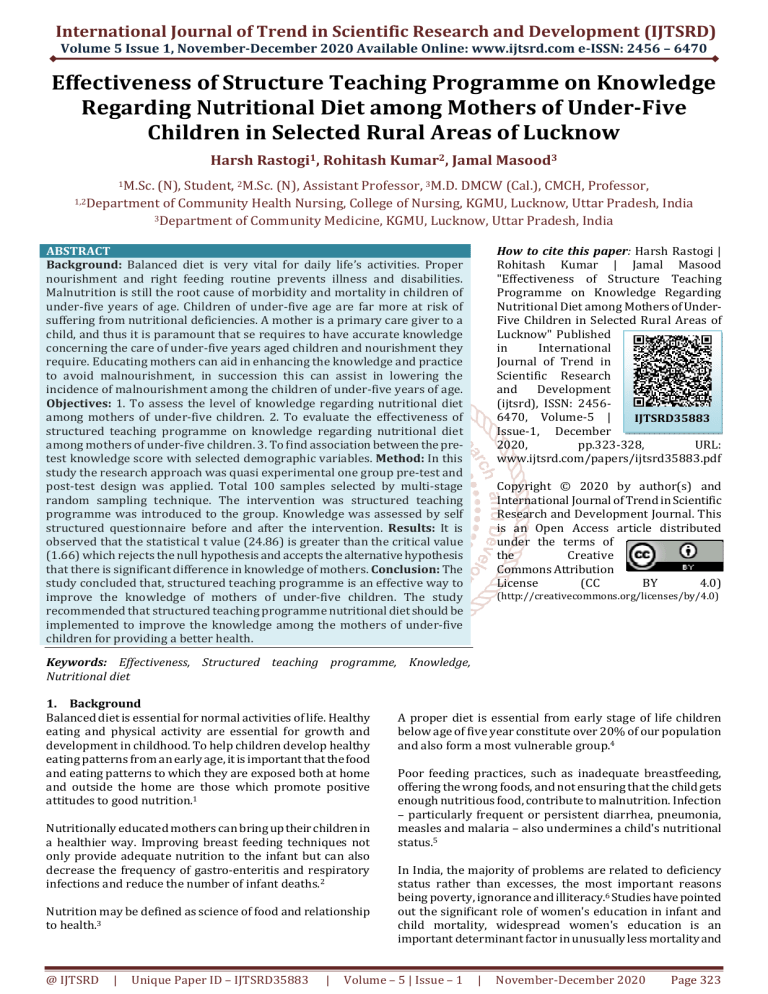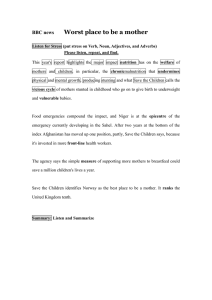
International Journal of Trend in Scientific Research and Development (IJTSRD)
Volume 5 Issue 1, November-December 2020 Available Online: www.ijtsrd.com e-ISSN: 2456 – 6470
Effectiveness of Structure Teaching Programme on Knowledge
Regarding Nutritional Diet among Mothers of Under-Five
Children in Selected Rural Areas of Lucknow
Harsh Rastogi1, Rohitash Kumar2, Jamal Masood3
1M.Sc.
(N), Student, 2M.Sc. (N), Assistant Professor, 3M.D. DMCW (Cal.), CMCH, Professor,
1,2Department of Community Health Nursing, College of Nursing, KGMU, Lucknow, Uttar Pradesh, India
3Department of Community Medicine, KGMU, Lucknow, Uttar Pradesh, India
ABSTRACT
Background: Balanced diet is very vital for daily life’s activities. Proper
nourishment and right feeding routine prevents illness and disabilities.
Malnutrition is still the root cause of morbidity and mortality in children of
under-five years of age. Children of under-five age are far more at risk of
suffering from nutritional deficiencies. A mother is a primary care giver to a
child, and thus it is paramount that se requires to have accurate knowledge
concerning the care of under-five years aged children and nourishment they
require. Educating mothers can aid in enhancing the knowledge and practice
to avoid malnourishment, in succession this can assist in lowering the
incidence of malnourishment among the children of under-five years of age.
Objectives: 1. To assess the level of knowledge regarding nutritional diet
among mothers of under-five children. 2. To evaluate the effectiveness of
structured teaching programme on knowledge regarding nutritional diet
among mothers of under-five children. 3. To find association between the pretest knowledge score with selected demographic variables. Method: In this
study the research approach was quasi experimental one group pre-test and
post-test design was applied. Total 100 samples selected by multi-stage
random sampling technique. The intervention was structured teaching
programme was introduced to the group. Knowledge was assessed by self
structured questionnaire before and after the intervention. Results: It is
observed that the statistical t value (24.86) is greater than the critical value
(1.66) which rejects the null hypothesis and accepts the alternative hypothesis
that there is significant difference in knowledge of mothers. Conclusion: The
study concluded that, structured teaching programme is an effective way to
improve the knowledge of mothers of under-five children. The study
recommended that structured teaching programme nutritional diet should be
implemented to improve the knowledge among the mothers of under-five
children for providing a better health.
How to cite this paper: Harsh Rastogi |
Rohitash Kumar | Jamal Masood
"Effectiveness of Structure Teaching
Programme on Knowledge Regarding
Nutritional Diet among Mothers of UnderFive Children in Selected Rural Areas of
Lucknow" Published
in
International
Journal of Trend in
Scientific Research
and
Development
(ijtsrd), ISSN: 24566470, Volume-5 |
IJTSRD35883
Issue-1, December
2020,
pp.323-328,
URL:
www.ijtsrd.com/papers/ijtsrd35883.pdf
Copyright © 2020 by author(s) and
International Journal of Trend in Scientific
Research and Development Journal. This
is an Open Access article distributed
under the terms of
the
Creative
Commons Attribution
License
(CC
BY
4.0)
(http://creativecommons.org/licenses/by/4.0)
Keywords: Effectiveness, Structured teaching programme, Knowledge,
Nutritional diet
1. Background
Balanced diet is essential for normal activities of life. Healthy
eating and physical activity are essential for growth and
development in childhood. To help children develop healthy
eating patterns from an early age, it is important that the food
and eating patterns to which they are exposed both at home
and outside the home are those which promote positive
attitudes to good nutrition.1
Nutritionally educated mothers can bring up their children in
a healthier way. Improving breast feeding techniques not
only provide adequate nutrition to the infant but can also
decrease the frequency of gastro-enteritis and respiratory
infections and reduce the number of infant deaths.2
Nutrition may be defined as science of food and relationship
to health.3
@ IJTSRD
|
Unique Paper ID – IJTSRD35883
|
A proper diet is essential from early stage of life children
below age of five year constitute over 20% of our population
and also form a most vulnerable group.4
Poor feeding practices, such as inadequate breastfeeding,
offering the wrong foods, and not ensuring that the child gets
enough nutritious food, contribute to malnutrition. Infection
– particularly frequent or persistent diarrhea, pneumonia,
measles and malaria – also undermines a child's nutritional
status.5
In India, the majority of problems are related to deficiency
status rather than excesses, the most important reasons
being poverty, ignorance and illiteracy.6 Studies have pointed
out the significant role of women's education in infant and
child mortality, widespread women's education is an
important determinant factor in unusually less mortality and
Volume – 5 | Issue – 1
|
November-December 2020
Page 323
International Journal of Trend in Scientific Research and Development (IJTSRD) @ www.ijtsrd.com eISSN: 2456-6470
yet low income regions and it has been noted that similar set
of relationship has been noted with regard to women's
education and child's nutritional status. Mother's education
can generate different types of intra household effects and
thereby reducing the risk of nutritional deficiency like
Protein -Energy Malnutrition.
The effects which will bring through mothers’ education were
improved health and nutrition knowledge, psychological
changes and improved nutritional behavior, shift of power
relations within the household in favor of better nutrition
which includes breast feeding, weaning practices and child
feeding and pregnancy diets may lead to more effective
dietary behavior on the part of mother's who manage food
resources within the household7.
2. Statement of the Problem
A study to assess the effectiveness of structured teaching
programme on knowledge regarding nutritional diet among
mothers of under-five children in selected rural area of
Lucknow
3. Objectives
A. To assess the level of knowledge regarding nutritional
diet among mothers of under-five children.
B. To evaluate the effectiveness of structured teaching
programme on knowledge regarding nutritional diet
among mothers of under-five children.
C. To find association between the pre-test knowledge
score with selected demographic variables.
Hypothesis
H0 : There is a significant difference between the mean pretest and post-test level scores among mothers of underfive children.
H1: There is a significant association between pre-test score
and selected socio-demographic variables.
4. Methodology
Research approach: A quantitative research approach
Research design: Quasi experimental one group pre-test
post-test design.
Setting of the study: Study was conducted in selected rural
areas of Lucknow.
Research variables: Independent variable: Knowledge of
mothers of under- 5 children
Dependent Variables: Structured Teaching Programme
Demographic variables: This includes mother’s age in years,
mother’s educational level, occupational status, religion, type
of family, monthly income of family in rupees, number of
under-five children in family, utilization of health services,
dietary pattern, previous knowledge, sources of previous
knowledge.
Target population: The population of this study was
mothers of under-five children who fulfill the inclusion
criteria of the research study.
Accessible population: In this study assessable population is
all the mothers of under-five children residing in rural areas
@ IJTSRD
|
Unique Paper ID – IJTSRD35883
|
of Sarojini Nagar, Lucknow and are willing to participate in
the study.
Sample size: It consisted of 100 mothers. Samples were
selected from selected rural areas of Lucknow.
Sampling Technique
In this study a multi-stage random sampling was used.
Multistage random sampling can be a complex form of cluster
sampling because it is a type of sampling which involves
dividing the population into groups (or clusters). Then, one
or more clusters are chosen at random and everyone within
the chosen cluster is sampled. 100 mothers were selected by
multi-stage random sampling technique from the selected
rural areas of Lucknow.
Criteria for Samples Selection:
Inclusion criteria:
Mothers of under-five children residing in rural area of
Sarojini Nagar, Lucknow.
Mothers who are willing to participate in the study.
Mothers who can understand Hindi language.
Exclusion Criteria:
Mothers who are not available at the time of data collection.
Mothers who have history of mental illness or any kind of
physical illness. Mothers who have history of hearing
disability.
Description of Tool
Section A: Demographic Questionnaire- 11 items
Demographic questionnaire for mothers consist of 11 items
such as Mother’s age in years, Mother’s educational level,
Occupational status, Religion, Type of family, Monthly income
of family in rupees, No. of under-five children in family,
Utilization of health services, Dietary pattern, Previous
knowledge, Sources of previous knowledge.
Section B: Knowledge Questionnaire- 20 items
The tool consists of 20 items, seeking information regarding
the level of knowledge of mothers of under-five children
regarding nutritional diet. The score given for the right
answer score is 1 and for wrong answer and not attempt
score is 0. The maximum score is 20 and minimum score is 0.
Reliability
Reliability refers to the accuracy and consistency of
information obtained in a study.
Reliability was found by using Karl Pearson test retest
method based on pilot study data. Reliability for knowledge
test was 0.707. The tools were found to be reliable.
Data collection procedure:
The data collection was done by multi-stage random
sampling technique. Sarojini Nagar block was selected as
PHC, Sarojini Nagar is adopted by KGMU. Sub-centers were
selected using lottery method & villages under these subcenters were selected. Self-introduction was given to the
participants. Purposes and benefits of the study were
explained to the participants and informed consent was
taken. Questions were explained to the participants if any of
the participants were not able to understand. On the day one
pre-test was conducted and structured teaching programme
Volume – 5 | Issue – 1
|
November-December 2020
Page 324
International Journal of Trend in Scientific Research and Development (IJTSRD) @ www.ijtsrd.com eISSN: 2456-6470
was also administered. Post-test was conducted after seven
days of intervention.
Plan for data analysis
Statistical analysis is the organization and analysis of
quantities data using statistical procedures including both
descriptive and inferential statistics.
Ethical consideration
Ethical approval obtained from the institutional ethic
committee and permission was taken from the departmental
HOD’s. Informed consent was taken from the subjects.
Confidentiality and anonymity of information was
maintained.
Result
Section 1: Description of socio-demographic variables of mothers of under-five children.
Table 1: Frequency & percentage distribution of subjects related to their socio-demographic variables
n=100
S. No.
@ IJTSRD
Variables
Categories
1.
Mother’s age in years
2.
Mother’s educational level
3.
Occupational status
4.
Religion
5.
Type of family
6.
Monthly income of family in rupees
7.
No. of under-five children in family
8.
Utilization of health services
9.
Dietary Pattern
10.
Previous knowledge
11.
Sources of previous knowledge (if
answered Q.10. as Yes)
|
Unique Paper ID – IJTSRD35883
|
Frequency
18-25
26-33
34-41
No formal education
Primary
Secondary
High school
Intermediate
Graduate
Post graduate & above
Other specify
Private job
Government job
Homemaker
Agriculture
Daily wage workers
Self employed
Hindu
Muslim
Sikh
Christian
Others
Joint
Nuclear
Extended
Less than 4000/4,001 to 6000/6,001 to 10,000/More than 10,000/One
Two
Three
More than three
Government health care
services
Private health care services
Home remedies
Quacks
Vegetarian
Eggarian
Non-Vegetarian
Yes
No
News paper
Radio/ Television
Friends and relatives
Health personnel
Volume – 5 | Issue – 1
|
%
30
70
0
26
33
41
0
0
0
0
0
0
0
77
20
3
0
67
33
0
0
0
71
29
0
3
71
20
6
36
64
0
0
30%
70%
0
26%
33%
41%
0
0
0
0
0
0
0
77%
20%
3%
0
67%
33%
0
0
0
71%
29%
0
3%
71%
20%
6%
36%
64%
0
0
55
55%
42
3
0
45
0
55
95
5
0
2
1
5
42%
3%
0
45%
0
55%
95%
5%
0
20%
10%
50%
November-December 2020
Page 325
International Journal of Trend in Scientific Research and Development (IJTSRD) @ www.ijtsrd.com eISSN: 2456-6470
Table 1 depicts that frequency & percentage distribution of mothers of under-five children in relation to demographic
variables.
Section 2: Analysis and interpretation of pre-test and post-test scores of knowledge of mothers of under-five children
regarding nutritional diet
Table 2: Level of knowledge among the mothers of under five children regarding nutritional diet
n=100
Pre-test Post-test
Level of knowledge Category
f
%
f
%
Good
>15 score
0
0
39
39
Average
8-15 score
47
47
58
58
Poor
<8 score
53
53
3
3
Table 2 reveals that among the 100 subjects 53% of subjects scored poor and 47% of subjects scored average in the pre-test
knowledge regarding nutritional diet. In post-test knowledge regarding nutritional diet 59% of subjects scored average, 39% of
mother’s subjects scored good and 3% of subjects scored poor.
Table 3: Mean score and standard deviation of the mothers of under-five children regarding nutritional diet.
n=100
Pre-test Post-test
Level of knowledge
n=100
n=100
Mean
6.86
10.29
Standard deviation
2.36
4.53
Table 3 depicts that the mean pre-test score of the subjects was 6.8 and the post-test mean score was 10.29. The standard
deviation of pre-test score was 2.3 and the post-test score was 4.5. Mean post-test score was significantly higher than the
mean pre-test score.
Section 3: Effectiveness of structured teaching programme on knowledge regarding nutritional diet among mothers of underfive children.
Table 4: Comparison of mean, standard deviation and‘t’ value scores of mothers regarding knowledge of mothers
of under-five
Knowledge
N
Mean
SD
df Paired t value
PRE-TEST
POST-TEST
100
6.8600
2.3657
10.29
4.535
24.864
P <0.05
99
The data presented in the Table 4 shows that the subjects’ mean post-test knowledge score (10.29) was apparently higher than
the mean pre-test knowledge score (6.86). The dispersion of the pre-test score (SD= 2.36) was more than their post-test score
(SD= 4.53), which shows that the level of knowledge of the subjects were improved.
Hypothesis testing
H0 : There is no significant difference between pre-test and post-test mean knowledge score of mothers of under-five
children regarding nutritional diet.
H1 : There is a significant difference between pre-test and post-test mean knowledge score of mothers of under-five children
regarding nutritional diet.
The researcher compared the calculated t- value (24.86) with the tabulated value (1.66). The obtained “t” value on analysis
of the data was found to be significant at p<0.05 level. Since the calculated value lay beyond the tabulated value, the researcher
rejected the null hypothesis and accepted the research hypothesis which revealed there is a significant change in the post-test
practice score of subjects regarding nutritional diet. So, this is evident that the structured teaching programme on knowledge
regarding nutritional diet was effective.
Section 4: Association of pre-test level of knowledge score with socio demographic variables.
@ IJTSRD
|
Unique Paper ID – IJTSRD35883
|
Volume – 5 | Issue – 1
|
November-December 2020
Page 326
International Journal of Trend in Scientific Research and Development (IJTSRD) @ www.ijtsrd.com eISSN: 2456-6470
Table 4: Association between the pre-test knowledge score of mothers regarding nutritional diet and their
selected demographic variables
RESPONDENTS
P value
χ2
KNOLEDGE
<0.05
VARIABLES
CATEGORY
SAMPLE
value
AVERAGE
POOR
18-25 years
30
13
17
3.84
0.54
Mother’s age in years
26 – 33 years
70
35
35
df=1
NS
34-41 years
00
0
0
No formal education
26
10
16
Primary
33
17
16
Secondary
41
20
21
High school
0
0
0
5.99
0.58
Mother’s educational level
Df=2
NS
Intermediate
0
0
0
Occupational status
Religion
Type of family
Monthly income of family in
rupees
Number of <5 children
Utilization of health services
Dietary Pattern
Previous knowledge
Sources of previous
knowledge(if answered Q.10.
as Yes)
Graduate
Post graduate & above
Other specify
Private job
Government job
Homemaker
Agriculture
Daily wage workers
Self employed
Hindu
Muslim
Sikh
Christian
Others
Joint
Nuclear
Extended
Less than 4000/4,001 to 6000/6,001 to 10,000/More than 10,000/One
Two
Three
>Three
Government health care
services
Private health care
services
Home remedies
Quacks
Vegetarian
Eggarian
Non-Vegetarian
Yes
No
News paper
Radio/ Television
Friends and relatives
Health personnel
0
0
0
0
0
77
20
3
0
67
33
0
0
0
71
29
0
3
71
20
6
36
64
0
0
0
0
0
0
0
37
8
2
0
27
20
0
0
0
34
13
0
0
21
10
4
20
27
0
0
0
0
0
0
0
40
12
1
0
40
13
0
0
0
37
16
0
3
50
10
2
16
37
0
0
56
27
29
41
19
22
3
0
45
0
55
95
5
24
16
9
46
1
0
21
0
25
46
1
8
9
4
22
2
0
24
0
30
49
4
16
7
5
24
5.99
Df=2
0.63
NS
3.84
Df=1
1.77
NS
3.84
Df =1
0.78
NS
7.82
Df =3
0.06
NS
3.84
Df =1
0.19
NS
5.99
Df =2
0.87
NS
3.84
Df =1
0.90
NS
3.84
Df =1
0.21
NS
7.82
Df =3
0.51
NS
*Significant at 0.05 level
NS: non- significant
@ IJTSRD
|
Unique Paper ID – IJTSRD35883
|
Volume – 5 | Issue – 1
|
November-December 2020
Page 327
International Journal of Trend in Scientific Research and Development (IJTSRD) @ www.ijtsrd.com eISSN: 2456-6470
Discussion
Among the 100 mothers of under-five children 53% of
mothers scored poor and 47% of mothers scored average in
the pre-test knowledge regarding nutritional diet. In posttest knowledge regarding nutritional diet 59% of mothers
scored average, 39% of mothers scored good and 3% of
mothers scored poor. The mean pre-test score of the
mothers was 6.8 and the post-test mean score was 10.29.The
standard deviation of pre-test score was 2.3 and the posttest score was 2.1.Mean post-test score was significantly
higher than the mean pre-test score.
The study finding proved that the structured teaching
programme intervened by the researcher was effective to
increase the knowledge regarding nutritional diet among
mothers of under-five children. So, there is a need of
providing proper information and demonstration and
education regarding nutritional diet, its importance, benefits,
and diseases related to lack of nutritional diet.
There was a statistically significant difference between pre
and post-test practice knowledge regarding nutritional diet
among mothers of under-five children at level P < 0.05 which
depicted the effectiveness of the structured teaching
programme regarding nutritional diet.
REFERENCES
[1] Ahmed I. et al. Lactation, breast-feeding
supplementation and nutrition .Journal of Ayub
Medical College.JAMC.2001; 13(2): 34-37. Available
from: http://jamc.ayubmed.edu.pk.
There was no significant association between the pre-test
knowledge score of mothers regarding nutritional diet with
their demographic variables.
So, health care provider should provide health education to
improve their knowledge regarding nutritional diet among
mothers of under-five children.
[2]
Patali C. S. A Descriptive Study to Assess the
Knowledge of Mothers Regarding the Nutrition for
Under Five Children in Selected Areas of Bagalkot
with a View to Develop a Self Instructional Module.
Crimson publishers.2018; 3(4): 1-10. Available from:
https://crimsonpublishers.com.
[3]
UNICEF. Breastfeeding. 2015. Available from:
https://www.unicef.org
[4]
Swaminathan M., Advanced Text Book of Food and
Nutrition.2nd Edition; Published by Bangalore Printing
and Co limited: page no 230,540.
[5]
Malnutrition.
WHO.
2017;Available
from
http://www.who.int/maternal_child_adolescent
[6]
Viswanathan J., “Achar’s Text book of Pediatrics”,
2007, 3rd Edition, Orient Longman Private Limited,
Hyderabad. Page No.68-72.
[7]
Kumari N., “A text book of child Health Nursing-I” first
Edition, S. Vikar& Co. Publishing House, Jalandhar,
Page No. 495.
Level of knowledge regarding nutritional diet among
mothers of under-five children.
The mean pre-test score of the subjects was 6.8, there was
marked gain in the mean knowledge score of the group after
giving structured teaching programme 10.29.
The standard deviation of pre-test score was 2.3 and the posttest score was 2.10.
5. Conclusion
Based on these findings of the study, it shows that the level
of knowledge regarding nutritional diet among mothers of
under-five children in the pre-test score was lower than the
post-test score.
@ IJTSRD
|
Unique Paper ID – IJTSRD35883
|
Volume – 5 | Issue – 1
|
November-December 2020
Page 328



